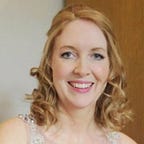How to shift writer’s block or fear of the blank page.
There are many helpful suggestions on what to do to get over that blank page anxiety. Google it. Here on medium, there are many, such as https://writingcooperative.com/do-you-suffer-from-fear-of-the-blank-page-9ab50955e3d7
However, I thought I would share what I do. It works for me.
I open up a blank page. Yes, that’s right. I stare it right in the… page. I do nothing at first. I simply stare at it and cogitate/meditate/think about what I want to say in this book.
What is the most important thing you want your reader to get from your book? Is it a feeling? Which? Is it a message? What? Is it an idea? Why are you writing it?
Then I just start typing about that, just a stream of consciousness or even notes, it doesn’t matter, this isn’t the book and it isn’t meant to win a prize, it’s just for you.
Do not correct your spelling or grammar, don’t even bother with punctuation of you like. (I can’t help it, it’s like a reflex, and I have an RSA II in typing (Distinction, don’t you know), which means I can type without looking at over 100 wrods a minute — oh look, there you go, I’m not even going to go back and correct that. But, you’re not me and I don’t care if you use full stops, apostrophes or commas.
Here is my typing any old stuff about my book:
I want my reader to be immersed in the world of the 1750s, the real lives of the people that lived amongst the brothels, the theatres, the market stalls, the inns. I want pox and all, guts, muck, sweat, shit and noise. I want them to draw parallels with today, the notion of children being used, groomed, abused and yet being thought of as criminals by police, just because of their background and family life. The people in society that pray on them, that win because of their wealth and influence, and get away with it. This is a book about the underdogs and their battle to fight the system and the evil that lurks there…
Blather on as much as you like. No one else will read it (Ok, you are, but I won’t read yours, I promise).
Then start focussing on motivations for your MCs:
Tess remembers nothing before a year ago. Where did she come from? She desperately wants to know where she comes from. She is hungry for family. She is ready to put herself in danger, not only to discover her past, but to put an end to the sick murderer that is hunting down child prostitutes, especially when one of the victims is her best friend. Even when she realises that she is the only survivor of this man, she is more determined. She trusts too easily and is beginning to learn that sharks circle her. Her journey is discovery, of her history but also a maturing, a gaining of herself, who she is and what she stands for.
You get the idea. What themes, morals, messages, feelings do you want to give the reader.
I then like to keep typing, discussing with myself possible ways I might convey these motivations, possible scenes that might show feelings, why do what they do. Sometimes, I just write lists of likes and dislikes, memory fragments, dreams, hopes, (most of which will never make it into the book).
Try to switch off any conscious thoughts and just let your fingers come up with stuff. They’re surprisingly good at it, when you don’t you get in your own, damn way.
The point is, you aren’t writing the book yet, you are just typing stuff around the book, filling in the background for yourself, focussing your thoughts, and preparing your mind and body for the actual task ahead.
Remind yourself that you are not writing your book yet. This is just notes and thoughts.
The next important thing I recommend is:
Write the query letter and synopsis before you start writing your actual book.
It’s hard. I’m not going to lie. But it will focus your mind on the real hook for the reader, what will draw them in, what are the motivations of the MCs. The crux of the book. And you aren’t sending this one out. It is just for you. But try to get it really succinct, keep to the main points, try to make it sound exciting. Distil your thoughts you just blahed on about into just one page.
Then go back to you random thoughts you just typed and just start playing with opening lines, sentences from the opening scene. Again, no corrections, no need to edit, just lots of possibilities. It could also be any other chapter, or the ending. Your choice.
Finally. This also works when you are stuck in the middle of a chapter, or book or scene.
Open a separate blank page and just start typing gibberish. Switch off you thinking brain and let your fingers come up with stuff. Type about feelings, themes, random thoughts and ideas, it doesn’t matter. Eventually, you will blather your way out of the hole.
If it is a plot knot. Then put it down. Go for a walk, do something else for a little while, then do the exercise above.
Still stuck? Try https://writershq.co.uk/writing-course-list/ plotstormers or Troubleshoot your novel courses.
Good luck.
